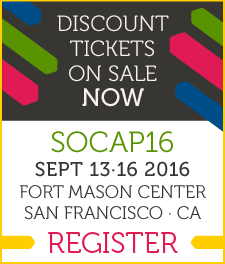SOCAP 365 event: June 29, 2016 at Impact Hub DC
Although the U.S. food system works well for some, our June 29th panel featuring local and national experts began with the acknowledgement that there are too many social, economic, and environmental costs which are not accounted for in the price of food. What would a more inclusive food system at scale look like? For starters, it would ensure that food that “truly nourishes producers, consumers, communities and the earth” is available to all, in the words of Real Food Challenge.
Tom McDougall (4P Foods), Olivia Rebanal (Capital Impact Partners), and Ronnie Webb (The Green Scheme), talked with moderator Lindsay Smith (Food Systems Consultant, Metropolitan Washington Council of Governments) about how they’re working to build a more inclusive food system where real food is not the exception, but the norm.
The discussion covered a lot of ground, from the role that a proposed “food port” could play in bringing together local food distributors, to examples of financing being used in California and Michigan to support the real food economy, to work that is happening in Wards 7 and 8 in DC to improve access to healthy food (see full slideshow here). Underinvestment east of the Anacostia River severely limits community members’ ability to get food at conventional retail outlets like supermarkets.
Impact Hub DC member Brandy Brooks (Director of Programs, Dreaming Out Loud), challenged the panel and the audience to consider the role that historical and current racism, oppression and exploitation have played in creating underinvestment, disinvestment, and a broken food system that fails so many community members in Wards 7 and 8. She further urged participants to look to the leadership of African-Americans and other people of color who are working to build a more sustainable, equitable food system, so that we seek solutions that truly build local control and agency. Her comments were met with resounding applause from the audience.
Asked what he took away from the event, Tom McDougall reflected that it “was a humbling reminder that the people in this region who are working to create a more just and equitable food system are engaged, passionate, and doing incredible work…there is a growing number of leaders throughout the region who are banding together to evolve not just our food system, but our economic system that has, for too long, not taken into account the externalized costs of capitalism.”
For her part, Olivia Rebanal noted that “there are a range of food entrepreneurs in the food system that need a variety of financial and technical supports, and the food economy needs to be fueled by the voices of the community members. Informed by these needs, a consortium of partners should come together to piece together solutions to build a sustainable food system that is equitably accessible by all.”
For more on this conversation, check out these additional resources:
- The Wallace Center’s Food Hub Survey Report, full of information and data that informs much of the work being done around scaling local, ethically produced foods
- Example of a food port design project in West Louisville
- Opportunities to get engaged in food policy discussions in the region: DC, Montgomery, Prince George
- Chesapeake Foodshed Network’s excellent resource guide that they publish at least once/month, latest one here
- Sample of Capital Impact’s funding approach for solutions to food deserts in California
- SOCAP13, Sarah Fritschner on scale and impact of cheap food in Kentucky
And these upcoming events on DC food systems:
Tags: Neighborhood Economics, socap365, Sustainable Food & Agriculture



